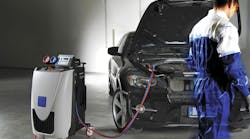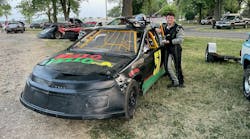Are individual state legislatures allowed to ban insurer-owned body shops? A federal appeals court is mulling that issue as it hears legal arguments regarding the fate of Texas House Bill 1131. The measure, which was promulgated under the auspices of the Texas-based Automotive Service Association (ASA) and other industry advocates, places restrictions on Allstate's ownership of its Sterling Autobody Centers.
There are 64 Sterling shops operating in 16 states, prompting widespread interest in the ultimate outcome of the case. H.B. 1131 has previously passed constitutional muster with the U.S. District Court for the Northern District of Texas. Allstate is challenging that ruling before the U.S. Fifth District Court of Appeals. It is unknown when a ruling on Allstate, et al. vs. Greg Abbott, et al. will occur.
"There's no deadline for the court to make its decision," explains Mike Siemienas, an Allstate spokesman, expressing confidence that the insurer will prevail and set a positive precedent for Sterling shops across the country.
Among the numerous legal complexities is Allstate's contention that H.B. 1131 conflicts with the Commerce Clause of the U.S. Constitution, unfairly infringing upon Sterling's business endeavors. (Among the lawyers working on Allstate's behalf is Kenneth W. Starr, who gained fame for the Monica Lewinsky investigation during the Clinton administration.)
"Allstate and Sterling continue to believe Texas H.B. 1131 unconstitutionally limits Texas consumers of access to a lawful and legitimate, high-quality, customer-focused, cost-effective repair option," according to Jim Murray, assistant vice president of claims, who issued a statement following the district court's ruling. "We will continue to fight the special interests that are trying to suppress fair competition in a free marketplace."
While Allstate and Sterling must abide by the requirements of Texas H.B. 1131 pending the appeals court ruling, including not opening any new Sterling shops in Texas, the company "remains committed to Sterling and its employ-ees," says Murray. "Sterling continues to provide the opportunity of a superior vehicle repair experience for Allstate customers and claimants. This is shown in a recent independent customer satisfaction survey where Sterling performs better than the industry in Texas."
ASA counters that insurer-owned shops create inherent problems that ex-pose vehicle owners to many problems.
"We believe that the Texas legislature did the right thing," says Bob Redding, the ASA's Washington, D.C., representative for governmental affairs. He points to the association's mission statement:
"ASA opposes insurance companies having an ownership interest in automotive repair facilities and views such interest as being in direct conflict with the consumers' right to choose. ASA has historically supported the consumers' absolute, unequivocal right to choose a repair facility for a collision or mechanical repair."
Redding also cites a provision that he says is germane to this case, which reads, in part: "ASA believes it is each member's inherent right to determine whether or not they wish to participate in direct repair programs (DRPs). DRPs are an integral part of the collision repair industry. These programs should be open to all shops that adhere to proven professional standards in quality of work, equipment and training of personnel."
Redding recalls how the legislation that became H.B. 1131 was first publicly broached by industry leaders and state Sen. John Carona at an International Autobody Congress and Exposition (NACE) press conference in Dallas.
In response to the district court's approval of H.B. 1131 despite the countering arguments of Allstate, Redding notes how "this new law in Texas demonstrates what collision shop owners can do when they join together with a common message under a single banner. Texas repairers should be proud and look to how they can continue to improve the collision repair industry."
The ASA and the Consumer Choice in Autobody Repair Coalition continue to push for H.B. 1131, filing a brief in reply to Allstate's appeal. The lengthy document cites a number of legal precedents to counter Allstate's contentions.
Relative to the federal commerce clause, the industry-filed brief emphasizes that H.B. 1131 was enacted to stop the encroachment of insurance companies into collision repair rather than restrict-ing multi-state chain shops in general.
Another element of the case that has generated considerable response from body shop owners, according to Redding, involves an industry consensus that "the Allstate-Sterling relationship highlights the need for H.B. 1131."
At the original trial, says the ASA/Coalition brief, witnesses testified that "allowing insurers to own auto repair shops was equivalent to letting HMOs own the hospital and also directly employ the doctor."
Citing court transcripts, other testimonial tidbits from the trial include:
- Insurance companies "force repairers to use cheaper, inferior parts, place caps on the prices . . . or steer business away from specific shops."
- They gave low estimates of what it cost to make repairs, making it more difficult to obtain competitive bids from shops Allstate did not control.
- Insurers forced the repair of vehicles under where qualified repair shops concluded that the vehicle was a "structural total."
- Allstate directed repair facilities to perform partial repairs or to cut corners when they could get away with it.
- Insurers tried to mandate the parts to use for repairs and at what cost, even though state law grants consumers a right to choose.
- Sterling did not engage in significant advertising but relied upon Allstate for referrals or customer steering. Sterling employees even admitted that they relied upon steering from Allstate agents.
- Allstate agents tried to steer customers, saying the repair facility they chose on their own was not an option.
- Allstate terminated repair facilities from their PRO program that were near Sterling shops to increase the business available to Sterling.
- After Allstate opened a Sterling facility near Toyota of Irving, it pressured that dealership until it went off Allstate's program. A dealership official testified: "[t]hey were out to drive us out of the market and that was their intent for the shops up and down the street."
Allstate, however, remains convinced that its arguments will meet the appeals court's approval and thus ensure the rejection of H.B. 1131 based on long-established legal precedents. "It's still in the brief," says Siemienas.

